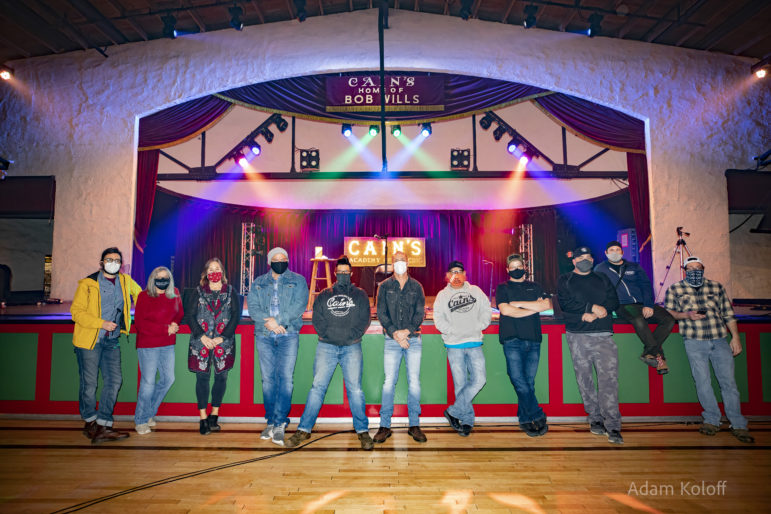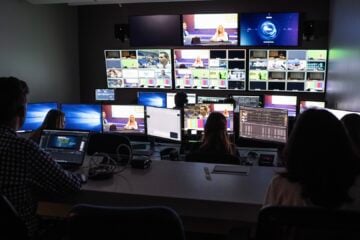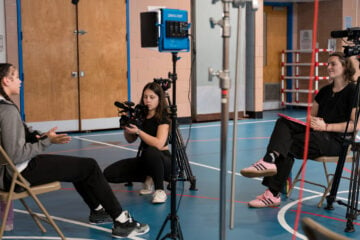Without a live audience, this variety show had to find a way forward

Adam Koloff
Greg Bollinger films musician Curley Taylor for "Live From Cain's."
The producers of a new Oklahoma-based variety show for public radio expect to finish up a first season this summer after the pandemic upended their plans for recording in front of a live audience.
After taping a pilot episode in May 2019, the team behind Live From Cain’s expected to complete an eight-show season by the end of 2020. But when live performances and interviews with rock, blues and Americana musicians became unworkable, co-EPs Kelly Burley and Julie Watson, a Tulsa-based music promoter, needed a plan B.
“It really was just a process of us starting and stopping and having to reassess — move forward, hit stop again, reassess, adjust, move forward,” said Burley, former station director at KOSU in Stillwater, Okla. “This has been throughout the whole project.”
At first, they pivoted toward building the show’s brand by livestreaming concerts on Facebook. AARP Oklahoma approached Burley and Watson to create a series of “Happy Half Hour” concerts on Fridays in May 2020, with artists recording themselves at home with laptops and iPhones. Then in the summer and fall, Live From Cain’s began its own series of Facebook livestreams recorded in person but without an audience at Cain’s Ballroom, the show’s home theater.
As the end of the summer neared, Burley said, the producers chose to move ahead with recording radio shows rather than wait for the end of the pandemic. That involved finding a new host after their original host, alt-country musician Robbie Fulks, moved to the West Coast and decided not to travel. House band leader Paul Benjamin and singer-songwriter Paul Thorn now host the show.

Starting in November, Burley and Watson hoped to record in person with a studio audience of 100 people. They tested the format with a live audience for a livestream with artists JD Simo and Bryon Berline. Attendees had to follow both CDC and Tulsa Health Department guidelines, including wearing a mask at all times other than to eat or drink.
Then coronavirus cases surged in Oklahoma. The producers had to cancel the taping with an audience. “At that point, man, we were really afraid to move forward based on Oklahoma’s hospital capacity and our ability to keep everybody safe,” Burley said.
Another wrinkle arose when a member of the show’s house band tested positive for COVID before a December recording date. Rather than cancel the taping, producers had Thorn, who was scheduled as the guest artist, perform at Cain’s Ballroom without the band. After all house band members tested negative for COVID, they reunited to record their parts.
That left producers with the task of stitching the show together in postproduction, which Burley said was a challenge. Producers had envisioned the show as live and linear but are now transparent about how it has been recorded.
“We can always manufacture audience reaction to the music,” Burley said. “We didn’t feel like that was authentic.”
Remaining episodes will be recorded in a similar fashion. The co-EPs anticipate completing the season by August, with musical guests including Shemekia Copeland, Bobby Rush, and Curley Taylor & Zydeco Trouble.
Episodes will be made available for free to public radio stations via PRX as they are produced, with the initial episode available by the end of July. Some songs will be packaged as stand-alone videos for NPR Live Sessions.
Burley said the show was always intended to have a multimedia element, but “the mindset was always radio first, video second.” By doing video first, though, the producers were able to create a Tulsa page for NPR Live Sessions, joining 18 other cities.
“We’re hoping to be able to point stations to [the NPR Live Sessions Tulsa page] to say, ‘Go check out some of our music until we get our shows produced,’” Burley said.
While the livestreams will not be a part of the pilot season, Burley and Watson said they want to work with the artists they livestreamed in future episodes. The productions were an attempt at being flexible and providing free content “that would keep our name out there and lend to our relevance until we could get back to the normal thing,” Burley said.
Burley and Watson will test the radio show’s pilot episodes with stations and receive feedback from station personnel and station listeners. Burley said that they want to “learn and adjust and grow.”





